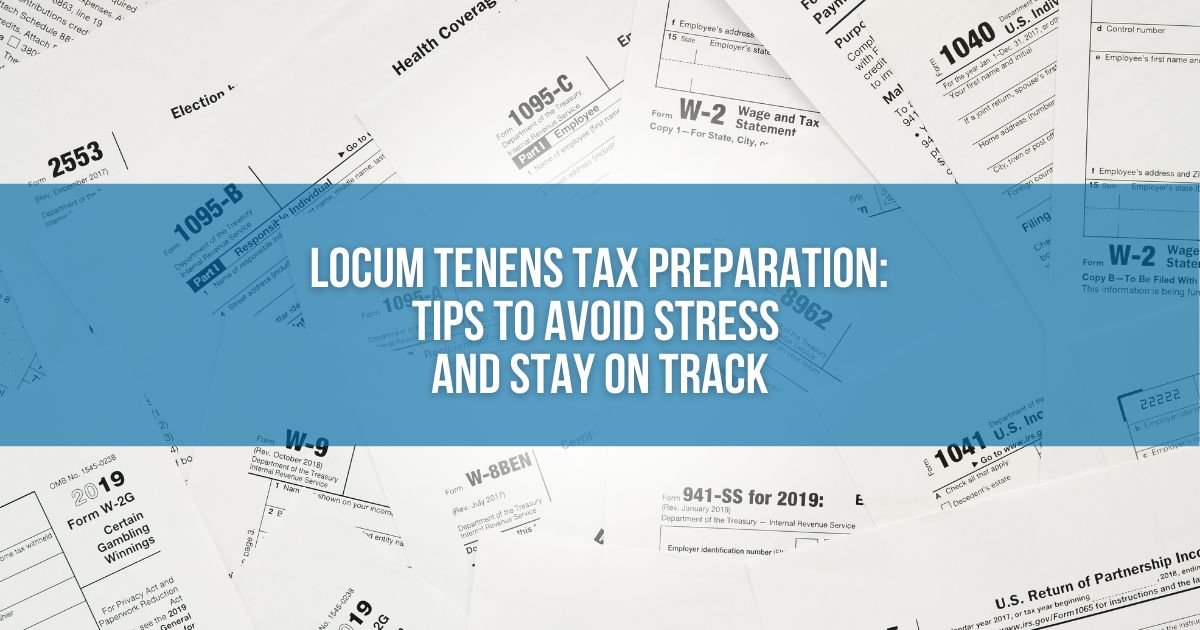Ten Ways for Physicians and Advanced Practitioners to Reduce Stress During Stress Awareness Month

Burnout, defined as a state of emotional, mental, and physical exhaustion caused by prolonged or repeated stress, is a growing concern among physicians and advanced practitioners.
As of 2024, nearly 50% of physicians reported experiencing burnout. In honor of National Stress Awareness Month, we're sharing ten stress-reduction tips and discussing how locum tenens work can play a crucial role in reducing stress and mitigating burnout among physicians and advanced practitioners.
Top 10 Ways Physicians and Advanced Practitioners Can Reduce Stress
1.) Exercise Regularly
Exercise can help reduce stress hormone levels and boost endorphins. Physicians and advanced practitioners can benefit from even brief walks, stretching, or yoga during breaks.
2.) Eat a Balanced Diet
A healthy diet and proper hydration can improve energy levels and reduce stress. Focus on whole foods and try to minimize caffeine and sugar intake.
3.) Connect with Others
Sharing your feelings with friends, family, or colleagues can be an effective way to relieve stress. Consider joining professional networks to connect with peers who understand your challenges.
4.) Prioritize Sleep
Quality sleep is essential for stress management. Aim for 7-9 hours of sleep each night, and create a consistent sleep routine to support better rest.
5.) Practice Mindfulness and Meditation
Mindfulness and meditation can help you stay grounded and reduce stress. Short breathing exercises or guided meditations can be easily integrated into a busy schedule.
6.) Journaling
Writing down your thoughts and feelings can be a therapeutic way to process stress and find coping strategies that work for you. It can also serve as a record of your progress in managing stress.
7.) Learn to Say No
Juggling many responsibilities can be overwhelming. It’s essential to be selective about taking on new obligations when you are already feeling pressure or burnout. Don’t be afraid to say “no.” It’s crucial to manage your time and stress cohesively to maintain a healthy lifestyle.
8.) Listen to Music
Music can help you relax and reduce stress. Find music that suits your mood—fast tempo for focus, slower tempo for relaxation—and play it during breaks or commutes.
9.) Spend Time with Animals
Spending time with animals can decrease cortisol levels to alleviate stress. Interacting with animals can also reduce loneliness, increase feelings of social support, and boost your mood.
10.) Chew Gum
Surprisingly enough, research shows that chewing gum can be a great remedy for managing anxiety and relieving stress.
Locum Tenens: A Burnout Solution
Locum tenens work offers physicians and advanced practitioners a unique opportunity to reduce stress and prevent burnout. It provides flexibility and control over your work schedule, allowing you to choose assignments that align with your needs.
Here's how locum tenens work can reduce stress for physicians and advanced practitioners:
Flexibility: When working locum tenens, you can select assignments that fit your lifestyle and professional goals, providing more control over your schedule.
Improved Work-Life Balance: Locum tenens assignments allow you to take breaks between contracts, giving you time to recharge and focus on your personal well-being.
Diverse Experiences: Working in various locations through locum tenens can keep your work experience fresh, reducing monotony and preventing burnout.
Exploring New Locations: Locum tenens work can take you to new places, offering a change of scenery that can revitalize and reduce stress.
Reduced Administrative Burden: Locum tenens do not often handle administrative tasks, allowing you to focus on patient care and reduce stress.
By following these stress-reduction tips and considering the benefits of locum tenens work, physicians and advanced practitioners can find a healthier balance between professional and personal life, reducing stress and preventing burnout.
Interested in working locum tenens with Medicus? Complete the short form below to connect with a Medicus Recruiter.


